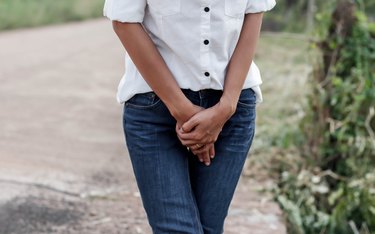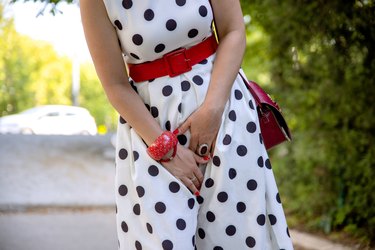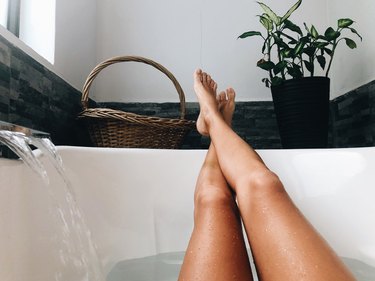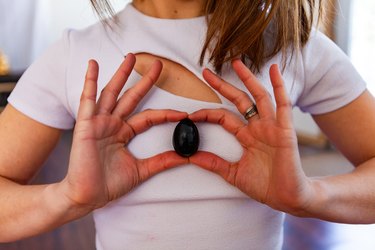
Real talk: On a soupy summer day, your armpits aren't the only body part that can sweat up a storm. Yep, sometimes it can get seriously swampy down south.
Whether it's caused by sweltering heat or a skin-related issue (more on this later), an excessively sweaty crotch can be uncomfortable (and extremely embarrassing).
Video of the Day
Video of the Day
Here, we spoke to Jessica Labadie, MD, a board-certified dermatologist and cosmetic surgery and laser fellow at SkinCare Physicians in Massachusetts, to get to the bottom of groin sweat (including why it happens and how to keep dry downstairs).
Do Vaginas Sweat?
Nope! The vagina is an internal organ that doesn't have any sweat glands, so you can't technically have a sweaty vagina. What some people think of as vagina sweat is actually sweat from the outer genital area, including the vulva and groin.
First, What Causes Crotch Sweat?
"Excessive sweating focused only in the groin is a type of focal hyperhidrosis and could be due to a number of different conditions or causes," Dr. Labadie says.
Here are a few of the most common culprits of chronic crotch sweat:
1. Environmental Factors
"Higher temperatures cause individuals to sweat more," Dr. Labadie says.
2. Exercise
"Vigorous exercise causes an individual's body temperature to rise and thus produce sweat," Dr. Labadie says.
3. Stress
"Emotional stimuli can lead to increased sweat production," Dr. Labadie says, and this includes groin sweat.
4. Occlusion
"Friction in the groin area can lead to more sweating," Dr. Labadie says. Sources of friction frequently include:
- Excessive pubic hair
- Tight underwear or clothing
- Excessive skin and fat
- Feminine hygiene products or materials that do not breathe
5. Certain Skin Conditions
Dermatological issues can also induce groin sweat. Here are the most common conditions that can create perspiration in your private parts, per Dr. Labadie:
- Intertrigo, or inflammation triggered by skin-to-skin friction, which typically appears in warm, moist areas of the body, such as the groin
- Inverse psoriasis, a type of psoriasis that occurs in regions where your skin rubs against itself
- Tinea cruris (aka jock itch), a fungal infection that results in a red, itchy rash in warm, moist areas of the body
- Erythrasma, a localized bacterial skin infection that usually occurs in skin folds, including the groin
- Acanthosis nigricans, a skin condition that produces thick, darker patches, generally in skin creases and folds, such as the groin
- Seborrheic dermatitis, a chronic form of eczema that causes scaly patches and red skin
Warning
If you notice a rash, itching or pain that accompanies your groin sweat, see a dermatologist immediately, as this may be a sign of a more serious health issue, Dr. Labadie says.
6 Tips to Stop Crotch Sweat
No matter the cause of your sweaty groin, the following strategies can help decrease dampness below the belt.
1. Try a Topical Antiperspirant
Just like you apply an antiperspirant to prevent pit sweat, you can do the same thing for your crotch area.
"In general, it is OK to use a topical antiperspirant in the groin region" as long as you avoid any direct application to the genitalia, Dr. Labadie says. "However, remember that this area of the body is more sensitive than other areas, and, as a result, it can be more prone to irritation."
Dr. Labadie recommends using a fragrance-free, mild antiperspirant like Almay Sensitive Skin Anti-Perspirant & Deodorant ($20.94 for a 6-pack, Amazon.com) or Vanicream Anti-Perspirant Deodorant ($9.99, Amazon.com). Both are very gentle and designed for sensitive skin, she says.
2. Apply an Anti-Fungal Powder
A sprinkle of antifungal powder may help prevent profuse perspiration in your pants.
Here's why: Sometimes an overproduction of yeast is contributing to the sweaty groin problem, Dr. Labadie says. "By choosing an anti-fungal powder, you can help both issues at once: getting rid of the moisture and addressing the overproduction of yeast in the area," she explains.
Her favorite antifungal powders are Zeasorb Prevention Treatment Powder ($7.03, Walmart.com) and Zeasorb AF Jock Itch Powder ($10.20, Walmart.com).
3. Pick Breathable Underwear
To stay dry, your nether regions need a little air down there. And the best way to keep them well-ventilated is by wearing breathable undies.
Cotton fabrics are fantastic for staying dry and airy, as are looser-fitting undergarments (read: boxers are typically better than briefs as far as breathability), Dr. Labadie says.
"However, if tighter clothing is needed for a specific event — such as tight padded shorts while biking — I would recommend hitting the showers immediately after your workout," Dr. Labadie says. "Clean and dry the area thoroughly and change into looser cotton-based clothing as soon as the workout is over."
4. Skip Pantyliners and Pads
Certain feminine products — like pantyliners and pads — can produce perspiration in your panties.
That's because "pantyliners and pads contain materials that can lead to increased occlusion, moisture and irritation in an already sensitive area," Dr. Labadie says.
So, if you can, try limiting your use of these sweat-inducing products — especially during workouts — or change them frequently, she says. You might opt to use tampons, or a menstrual disc or cup.
5. Trim Your Pubic Hair
Whether you groom your pubic hair or not is totally your prerogative. But if you're trying to get rid of groin sweat, it might be best to keep your short-and-curlies, well, on the shorter side.
Here's why: "Excessive pubic hair can lead to occlusion and moisture retention," Dr. Labadie says.
In other words, trimming your pubic hair can help minimize moisture and slash sweating.
6. See Your Dermatologist
If the above home remedies don't provide any relief, consult with your dermatologist who can properly assess and diagnose you.
Depending on the underlying issue, "there are a few prescription-level interventions that can be helpful," Dr. Labadie says.
For example, your doctor may prescribe a stronger aluminum chloride-based antiperspirant or an oral medication to help reduce sweating, she says.
"In severe cases, dermatologists may trial intradermal Botox injections to temporarily inhibit sweat gland secretion," Dr. Labadie adds.
Is this an emergency? If you are experiencing serious medical symptoms, please see the National Library of Medicine’s list of signs you need emergency medical attention or call 911.


